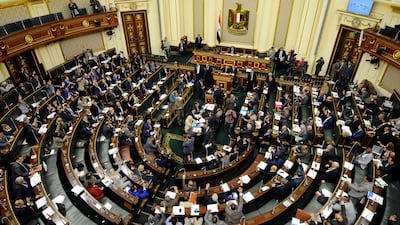Egyptian President Abdel Fattah El Sisi has returned a long-awaited overhaul of the country’s criminal procedure law to parliament for further review, citing objections to several provisions.
The law, finally approved by parliament on August 26, has been under discussion since late last year. It had been hailed by state officials as the most comprehensive reform of the penal code since 1950, but faced widespread calls for reconsideration from human rights activists.
Groups, including the Egyptian Initiative for Personal Rights, have long said that the law needs a review, criticising the use of pretrial detentions and broader judicial infractions against defendants as dangerous precedents.
A UN committee on torture issued a May report criticising the law and citing “systematic overuse of prolonged pretrial detention in politically sensitive cases” and the “selective application of presidential pardons and conditional releases”.
In a statement issued on Sunday evening, the Egyptian presidency said it received many objections to articles of the new law, primarily concerning issues of governance, clarity and practicality.
The draft submitted for ratification to the president required further study to ensure stronger protections for “the sanctity of private homes” and the “rights of defendants during investigations and trials”, the presidency said.
The revisions must also focus on expanding alternatives to pretrial detention, a contentious issue that has long drawn criticism from rights advocates, it added.
The presidency highlighted the need to address ambiguities in the text to avoid misinterpretation and implementation problems. It also stressed the importance of granting ministries and relevant institutions sufficient time to adapt to the law’s new mechanisms and provisions, ensuring smooth application.
The criminal procedure law, which governs investigations, prosecutions and trials, serves as a cornerstone of the country's justice system. The proposed amendments, once finalised, are expected to have far-reaching implications for millions of Egyptians.
Parliament is now tasked with addressing the presidency’s objections and refining the law before resubmitting it for ratification.
While returning the draft legislation to parliament, Mr El Sisi praised lawmakers for their efforts in drafting the amendments.
These included procedures for restricting suspects’ travel and placing them on national watch lists. Additionally, financial compensation for individuals subjected to pretrial detention in certain cases, and the reduction of maximum detention periods were two additions by the assembly praised by the president. Other new provisions include enhanced protections for witnesses and mechanisms to improve international judicial co-operation.
The presidency acknowledged that the amendments address key gaps in the existing law and included substantial reforms to long-standing procedures. However, it emphasised the need for revisions to ensure that the final legislation aligns with constitutional principles and upholds the country’s commitment to fair and efficient justice.
The draft law had been the subject of months of debate in parliament and was closely watched by legal experts and human rights advocates.
While some hailed the amendments as a step forward in modernising Egypt’s justice system, others criticised provisions that, they argued, could infringe on individual rights or expand the powers of law enforcement without adequate oversight.
Perhaps the most contentious articles are ones that would allow authorities to surveil online communications and electronic devices in cases involving crimes punishable by more than three months in prison.
Prosecutors would also be allowed to listen to and record private conversations – whether they are voice or video calls; inspect downloads, app store purchases and chat histories; and confiscate letters, parcels, newspapers and publications received by suspects. The courts would also be able to issue surveillance permission for a period not exceeding 30 days, although this could be renewed indefinitely.
The decision to return the legislation to parliament marks a significant development in the continuing effort to reform Egypt’s legal system and a rare move by an Egyptian president.
It also follows an order by Mr El Sisi to officials last week to study the possibility of pardons for Egyptian-British activist and blogger Alaa Abdel Fattah and six other convicts.


